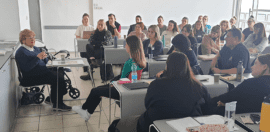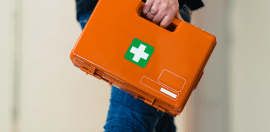NFP Maps Illegal Brothels to Protect Women

20 October 2016 at 11:42 am
Not-for-profit organisation Project Respect is, for the first time, mapping the hundreds of illegal and unregistered brothels in Melbourne to protect women from exploitation.
Currently in Victoria there are 91 licensed brothels, which offer some conditions and protection for workers, including the refusal to see a client if the situation appears unsafe.
But Project Respect executive director Rachel Reilly said there were little or no safety standards at illegal brothels, no basic conditions, and no limits on what women and girls were expected to do or asked to perform.
“There’s a lot of unprotected sex, if something goes wrong they can’t report it to people. We believe it’s a place of significant exploitation,” Reilly told Pro Bono Australia News.
“There’s just basically no controls over what happens to women in these spaces.”
She said illegal brothels were a significant problem, both in terms of numbers and their transient nature – operating from dodgy business fronts for several months before closing down, only to re-open in the same area.
“In Melbourne there are approximately 500 illegal brothels,” she said.
“In addition to that there’s a lot of apartments in the CBD that are being used as well.
“It is a significant problem, and then just through the nature of the brothels, the illegal brothels, they pop up, shut down, so [unless] someone is monitoring them they could disappear before anything is done.”
However, the problem is difficult to tackle, due to limited resources and council jurisdictions, which manage brothels, taking different approaches.
“We’ve been doing it [mapping brothels] because there isn’t really a coordinated approach to trying to shut down illegal brothels,” Reilly said.
“There’s some local councils that proactively work to shut them down, other local councils who know that they exist but they have a hands off approach – they think it’s a responsibility of other people.
“The sex industry coordination unit in Victoria Police, they’re just a team of five people. And so they oversee… the licensed brothels, but also they’ve got a responsibility with the unlicensed or the illegal as well.
“So there’s a lot of different parties, but not the coordinated response, and everyone acknowledges it’s an issue… we wanted to understand from our own findings the scope of the problem across the greater Melbourne region.”
Several local councils and a number of other government departments have already expressed an interested in assisting the organisation.
Rielly said said the maps would be a step towards engaging the women and girls working in illegal brothels.
“What we want is for the welfare of the women to be paramount,” she said.
“If there’s any raids or shutting down of the illegal brothels, to make sure that the women who are in there can be linked into services if they need it, if they feel that they need that support.
“Obviously I can’t speak for everyone, there could be women who don’t feel they need support, but we just want to make sure that is available to them.
“We just don’t think that that’s happening at the moment because we’re not really getting any referrals for women who have been in illegal brothels. Every so often we do, but it’s not a main source of referrals, so we think there’s a gap there in making sure women are supported and linked in.”
She also said there was still a lot more work to be done to regulate the sex industry.
“The fact that we meet women who are being exploited, who have been trafficked, who are experiencing violence in the legal brothels, the licensed brothels, I think obviously there’s a lot more that needs to be done in that area,” she said.
“The fact that we have such a huge amount of illegal brothels indicates that a lot more needs to be done. Not to say that the parties that are working in this space aren’t doing enough.”
Editor’s note added on July 18 2022: We would like to acknowledge that Project Respect have stated today that this article is not reflective of Project Respect’s work or position in 2022.








Don’t you think you should have asked the sex workers organisation in Victoria, VIXEN for some comment to balance out this story? Or anyone…. the police or the councils or someone… you can’t call yourself a journalist if you just take one person’s story and publish it. Sex workers in brothels, illegal or legal, do not want to be linked into ‘services’ after you’ve gone and closed down their workplace. Ask VIXEN or RhED in Victoria about this and they will tell you that
Yesss Candi, couldn’t agree more. VEry unbalanced journalism which encourages making working places even more unsafer for Victorian sex workers.